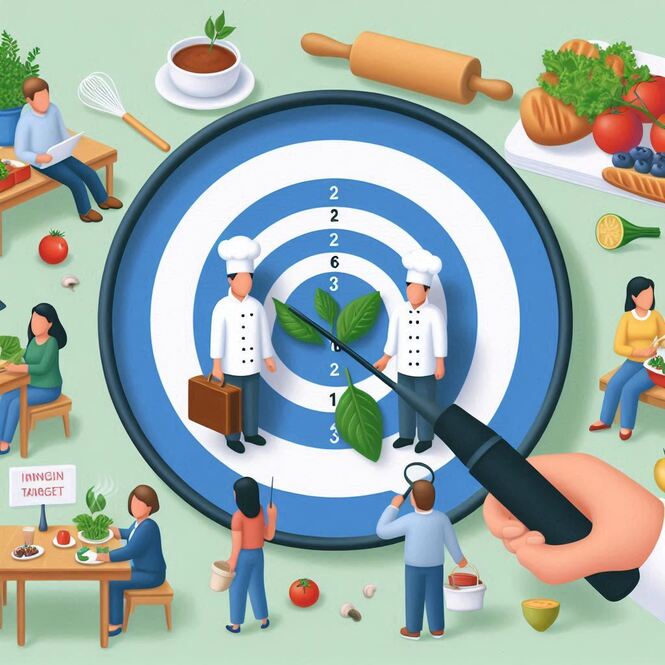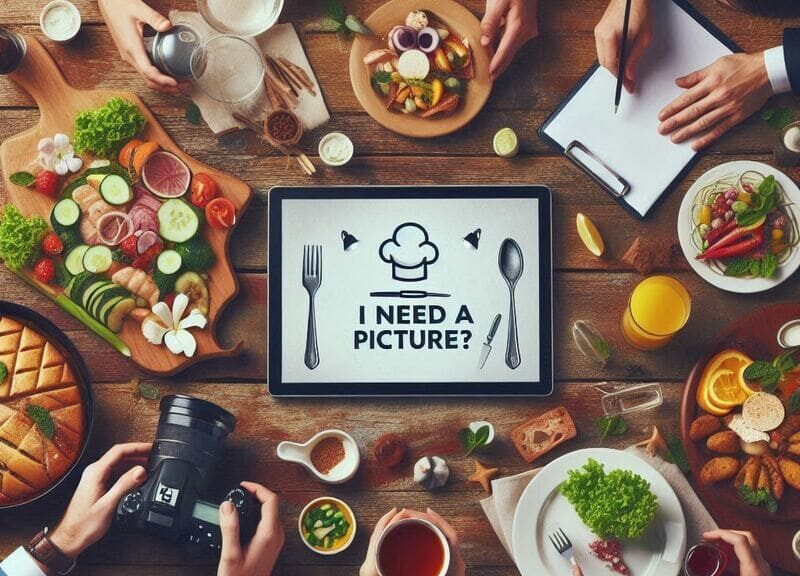In the bustling world of catering, standing out is crucial, and online marketing offers a powerful way to achieve that. With the digital landscape evolving, caterers have unprecedented opportunities to reach and engage with potential clients. Utilizing social media, search engine optimization, and targeted pay-per-click ads can elevate your catering business above the competition.
Crafting a robust digital marketing strategy enables caterers to maximize visibility and drive engagement. By harnessing the power of platforms like Google My Business and local SEO, caterers can tap into their local audience and improve discoverability. Engaging potential clients through visually appealing and informative content on social media also strengthens brand presence and boosts client interaction.
Integrating online efforts with traditional marketing ensures a seamless customer experience. Promotions and loyalty programs can foster long-term relationships, while outstanding service and presentation leave lasting impressions. An effective online marketing strategy not only attracts new clientele but also retains existing ones, growing the brand’s reputation and reach.
Key Takeaways
- Online marketing elevates catering businesses through social media and SEO.
- Robust digital strategies enhance visibility and client engagement.
- Balancing online and offline efforts strengthens brand reputation.
Understanding the Catering Business Landscape
In today’s catering industry, understanding key aspects such as your target market, competitive advantage, and unique selling proposition is crucial. By focusing on these elements, caterers can effectively position themselves and thrive in an increasingly competitive market.
Identifying Your Target Market
Identifying the target market for catering services is essential for business success. Understand the demographics, preferences, and needs of potential clients. Caterers should consider factors such as age, income, and event type preferences when defining their market.
Data analysis and surveys can help gather insights into customer preferences. Catering businesses are encouraged to use this information to tailor services and marketing efforts effectively. By concentrating on precise segments, caterers can develop personalized offerings that resonate with their audience.

Competitive Advantage
A well-defined competitive advantage differentiates a catering company from its competitors. To establish this, assess what distinguishes your services, such as specialty cuisines, exceptional customer service, or price flexibility. Consider what existing clients praise when thinking about what makes your catering business unique.
Investing in innovation can provide a competitive edge. Whether it’s through adopting sustainable practices or implementing advanced technology, these efforts can attract environmentally conscious clients and improve operational efficiency. Keep abreast of industry trends to identify areas for innovation that other businesses may overlook.
Unique Selling Proposition
A compelling unique selling proposition (USP) is vital for distinguishing your catering services. It should focus on how your business solves a specific problem or adds unique value compared to others. Craft a clear and concise USP that addresses the core needs of your target audience.
Highlight special elements like exclusive partnerships, exceptional presentation styles, or bespoke menus. Incorporate your USP in marketing materials and sales pitches to consistently reinforce what sets your catering services apart. A strong, well-communicated USP can significantly enhance market positioning and brand recognition.
Developing a Robust Digital Marketing Strategy
For caterers looking to succeed in the digital age, a well-crafted marketing plan is essential. Building an engaging website, optimizing for search engines, and leveraging email marketing are pivotal steps. Effective content creation also plays a central role in capturing the interest of potential clients.
Building an Engaging Website
A caterer’s website acts as a digital storefront, reflecting the brand’s identity and offerings. It should feature an intuitive layout with easy navigation, ensuring visitors can locate key information effortlessly. Visual appeal is crucial; include high-quality images of events and dishes to entice potential clients.
Utilizing effective calls to action (CTAs), such as “Request a Quote” or “Book a Tasting,” encourages user interaction. Mobile optimization is equally necessary, considering the rising number of mobile users. Incorporate elements like testimonials and client reviews to build trust and credibility.
Optimizing for Search Engines
Search Engine Optimization (SEO) is critical for improving visibility in online searches. Begin by conducting keyword research to identify terms potential clients might use. Integrate these keywords naturally within your site’s content, meta descriptions, and headings for better search engine ranking.
Ensure the website loads quickly and provides a seamless user experience, which are factors search engines consider in rankings. Regular updates to the content, such as blog posts or new service announcements, signal to search engines that the site is active and relevant.
Crafting Engaging Content
Content is king in digital marketing. Catering businesses should focus on creating valuable and engaging content that reflects their expertise and creativity. Formats like blogs, videos, and social media posts can effectively showcase services and reach a wider audience.
Consider a content calendar to plan regular updates, keeping audiences both informed and engaged. Sharing industry insights, event highlights, and recipes can position your business as an authority in the field. Interactive content, like polls or Q&As, can further increase engagement and client interaction.

Leveraging Email Marketing
Email marketing is a powerful tool for cultivating client relationships. Building a targeted email list allows direct communication with potential and existing clients. Use email campaigns to share special offers, promote upcoming events, or provide catering tips.
Segmenting email lists based on client preferences or behaviors helps in delivering personalized content. Create visually appealing newsletters with compelling subject lines to improve open rates. Include links to landing pages where recipients can learn more or take specific actions, like booking a service.
Expanding Reach with Social Media and PPC
Leveraging diverse social media platforms and creating targeted PPC campaigns are effective strategies to expand a catering business’s reach and attract new customers. These approaches can enhance brand awareness and maximize the impact of digital marketing efforts.
Utilizing Diverse Social Media Platforms
Social media platforms offer caterers a direct line to potential clients. Popular platforms like Instagram, Facebook, and Pinterest provide spaces to showcase culinary creations and services. Using high-quality images and engaging storytelling helps capture the audience’s attention.
Hashtags and geotags increase visibility and reach local audiences. Interacting with followers through comments and sharing user-generated content fosters community engagement. Each platform has unique features, such as Facebook’s event promotion tools or Instagram Stories, which can be harnessed to boost engagement and attract a wider audience.
Creating Targeted PPC Campaigns
PPC campaigns complement social media marketing by driving targeted traffic quickly. Platforms like Google Ads allow caterers to focus on specific demographics, locations, and search keywords. These ads appear to users actively searching for catering services, increasing the likelihood of conversions.
Crafting compelling ad copy and utilizing A/B testing can improve ad performance. Allocating a budget wisely ensures maximum return on investment. Detailed analytics provided by PPC platforms enable businesses to refine their strategies and focus on high-performing ads, ultimately reaching more potential customers efficiently.
Maximizing Local SEO and Google My Business
Catering businesses can significantly enhance their visibility and customer base through effective local SEO strategies and efficient use of Google My Business. Focusing on these areas will improve search rankings and draw in more local clientele.
Implementing Local Marketing Strategies
Local marketing is crucial for catering businesses targeting nearby customers. Begin by claiming your Google My Business profile. It provides a platform to display your business hours, contact information, and location. Ensure all details are accurate to build trust with potential clients.
Engage with local directories to boost your presence. Listing your business in places like Yelp or TripAdvisor can increase online visibility. Join community events and use social media to connect with local audiences. This interaction not only solidifies your presence but also enhances word-of-mouth referrals.
Backlinks from reputable local websites can enhance your SEO. These links provide credibility and improve search engine ranking. Prioritize partnerships with local businesses for mutual support and backlinks. Consistently review and update your online content to maintain relevancy and engagement.
Optimizing for Local Search
Optimizing for local search involves making your business easily discoverable online. Use local keywords within your website content. Phrases like “caterers near me” or “local catering services” align with what potential clients may search for. These keywords should appear naturally in your content.
A well-optimized Google My Business profile ensures you stand out in local search results. Include high-quality images and regularly update your business description. Collect and display customer reviews to build credibility and attract more local clients.
Ensure your website is mobile-friendly since many users will search for catering services via smartphones. Fast loading times and clear navigation enhance user experience, increasing the likelihood of converting visitors into customers. Keep track of your local SEO performance and make necessary adjustments based on metrics like local search rankings and website traffic.
Enhancing Customer Relations and Reputation
Customer relations and reputation are vital to the success of catering businesses. By focusing on encouraging reviews and managing customer service effectively, caterers can build a strong, positive reputation.
Encouraging Reviews and Feedback
Customer reviews can significantly impact a catering business’s online reputation. Encourage clients to leave positive reviews by providing exceptional service and timely follow-ups. Personal emails or messages asking for feedback can make clients feel valued and more inclined to share their experiences.
Implementing easy-to-use review platforms on your website or through third-party sites helps streamline this process. Offer incentives such as discounts on future orders to motivate customers to leave reviews. Regularly monitor feedback to address any issues promptly and demonstrate commitment to improvement.

Managing Customer Service
Effective customer service is at the heart of building lasting client relationships. Train staff to handle inquiries professionally and ensure they understand the importance of responding quickly to customer questions or concerns. Use a consistent communication style that reflects your brand values.
Incorporate customer service software to track interactions and ensure no communication slips through the cracks. Handling complaints gracefully and resolving them quickly can turn a dissatisfied customer into a loyal advocate. Regularly update FAQs and support resources to address common client concerns efficiently.
Integrating Offline Efforts with Online Marketing
Combining offline marketing with online tactics allows caterers to extend their reach and reinforce their brand. Strategic integration can help increase visibility, customer engagement, and overall success. This section will explore two effective methods for blending offline and online efforts.
Networking at Trade Shows and Events
Attending trade shows and local events presents invaluable opportunities for caterers. These occasions facilitate networking with industry professionals and potential clients. Caterers can showcase their offerings live, creating memorable experiences.
To leverage these interactions online, share real-time updates through social media platforms. Use hashtags and geotags related to the event to expand your reach. Capture and post engaging content, such as photos and videos, which highlight your booth and products.
Follow up with new contacts by connecting through LinkedIn or personalized emails. Share insights and content relevant to the event, which can keep the conversation going long after the event concludes. Engaging with attendees online builds relationships and helps strengthen your digital presence.
Utilizing Offline Marketing Materials
Physical marketing materials remain a critical tool for caterers. Items like brochures, business cards, and flyers convey professionalism and provide essential information about services. To integrate these with online marketing, ensure your website and social media handles are prominently displayed.
Deploy a QR code on each material that directs users to your website or a landing page. This bridge between offline and online helps drive traffic and encourages further interaction with your brand. Use flyers as a tool to promote special offers or a newsletter sign-up form online, encouraging conversions.
It’s essential to maintain design consistency between your physical and digital materials. A cohesive visual identity reinforces brand recognition and leaves a more lasting impression on potential clients.
Offering Promotions and Loyalty Programs
Strategic use of promotions and loyalty programs can boost customer retention and attract new clientele. By implementing attractive discounts and creating a robust loyalty program, caterers can enhance customer engagement and drive repeat business.
Creating Attractive Discounts and Coupons
Offering discounts can be an effective way to attract new customers and encourage existing ones to repeat purchases. Perks such as limited-time offers, early-bird discounts, and bulk order reductions can increase interest in particular events or periods.
To maximize effectiveness, it’s crucial to use a multi-channel approach. Announce deals on social media, your website, and email newsletters. Providing coupons for future purchases can also act as a gentle reminder for customers to return. Monitor conversions to evaluate the success of these promotions and adjust as needed to suit customer preferences and market trends.
Establishing a Loyalty Program
A well-implemented loyalty program can significantly boost customer retention. Design a program that rewards repeat customers with points for each purchase, redeemable for discounts, free items, or exclusive services.
Consider offering tiered rewards to further encourage frequent patronage. Clearly communicate how points are earned and redeemed through various platforms. Utilize technology to track customer purchases and offer personalized incentives. Engagement can be increased by reminding customers of their progress and upcoming rewards through personalized emails or text messages, fostering a connection with your brand.
Utilizing Content Marketing and Food Blogs
For caterers, content marketing and food blogs are essential tools to boost visibility online. Crafting a robust marketing plan and maintaining an engaging blog can significantly enhance customer interaction, foster brand loyalty, and improve search engine rankings.
Developing a Content Marketing Plan
A well-thought-out content marketing plan is crucial for maximizing the benefits of online presence. Begin by identifying clear goals such as increasing web traffic or boosting online orders. Consider your target audience’s preferences and align your content accordingly.
Use a mix of formats like videos, infographics, and articles to keep the content dynamic.
Set a realistic marketing budget that includes website updates, paid promotions, or collaborations with influencers. Monitor performance through analytics tools to measure which content types are most effective and adjust strategies as needed. Regularly updating content ensures continued audience engagement and relevance in a competitive market.
Engaging Through a Food Blog
A food blog is a valuable platform for showcasing your expertise and connecting with your audience. Create posts around themes like event planning tips, seasonal menu ideas, and catering success stories. Regular updates can establish authority and drive more traffic to your site.
Engage readers by encouraging comments and social media shares, fostering a sense of community. Use engaging content with visually appealing images and compelling narratives that resonate with readers. Additionally, integrate search engine optimization (SEO) strategies by incorporating relevant keywords, which improves your website ranking and reach.
By maintaining a vibrant blog, caterers can build a loyal following and sustain long-term customer relationships.
Specializing in Event-Specific Catering Marketing
Effective catering marketing must adapt to different event types. Wedding catering and corporate events have distinct needs, requiring tailored marketing strategies to successfully attract and retain clientele.
Strategies for Wedding Catering
Wedding catering demands attention to detail and personalization. Building relationships with wedding planners can increase referrals. Collaborate closely with them, showcasing a portfolio of your work. Include diverse styles and themes to highlight your versatility.
Host tasting events for couples. These provide a personalized experience, creating memorable impressions. Ensure that the tasting sessions offer a variety of menu options that can be customized to meet dietary preferences or cultural requirements.
Engage on social media platforms like Instagram or Pinterest, as these are popular among couples planning weddings. Use these sites to share photos and testimonials from past weddings.
Approaches for Corporate Events
Corporate event catering requires a focus on professionalism and efficiency. Highlight your ability to handle events of various sizes through case studies or endorsements from past corporate clients.
Develop a comprehensive online presence. Ensure your website details menus, services, and logistical capabilities. Utilize LinkedIn for connecting with business professionals and event coordinators.
Networking events for business leaders can present opportunities for showcasing your services directly. Offer a sampling of menu options paired with value propositions, such as commitment to using sustainable ingredients or exceptional service levels that align with corporate values.
These targeted strategies enhance visibility and reputation, positioning your catering business as an expert in the industry. Employing distinct approaches for weddings and corporate events enhances your success and client satisfaction.
Culminating the Experience with Outstanding Presentation and Service
Creating a memorable catering experience requires a focus on visual appeal and personalized client interactions. Catering businesses can enhance their brand by perfecting food styling techniques and offering tasting events that engage with clients on a more personal level.
Perfecting Food Presentation
Effective food presentation turns each dish into a visual delight, enhancing the dining experience. Strategically arranging colors, textures, and garnishes can highlight the freshness and quality of ingredients. Use white plates to make vibrant dishes stand out, or consider colored plates to complement the food’s palette.
Incorporating height through layering or stacking can add depth to your presentation. For instance, stacking items like vegetables or proteins can make dishes appear more refined. Employing a mix of serving styles, such as combining family-style platters with individual servings, offers visual and varietal interest.
Using edible garnishes, like herbs, flowers, or intricate drizzles of sauce, can add color and flavor without overwhelming the dish. Prioritizing cleanliness and attention to detail demonstrates care and professionalism, essential for leaving a lasting impression.
Hosting Tasting Events
Tasting events provide an opportunity for clients to experience your culinary offerings firsthand. They enable potential customers to interact with your team, sample menus, and refine their catering choices. Hosting these events in inviting settings with flexible pricing strategies can increase appeal.
Engage clients with seasonal menu samplings or showcase signature dishes to highlight your unique offerings. Consider collaborating with local vendors for a community-centric experience. This adds value and diverse flavors to events, helping potential clients visualize their future events with your catering.
Focus on exceptional customer service during tastings. Attentiveness to clients’ preferences and dietary needs ensures potential customers feel valued and understood. Gathering feedback during tastings offers insights for refining dishes and strengthening client relationships.

Analyzing and Adjusting Marketing Approaches
Effective online marketing for caterers involves constant evaluation and refinement of strategies to ensure maximum efficiency and return on investment. By consistently monitoring performance metrics and fine-tuning marketing techniques, caterers can better manage their marketing budgets and enhance brand exposure.
Monitoring Performance and ROI
Monitoring key performance indicators (KPIs) such as website traffic, engagement rates, and conversion metrics is essential to assess the effectiveness of online advertising efforts. Utilize tools like Google Analytics to track and analyze data, ensuring that marketing dollars are well-spent.
It’s important to calculate the return on investment (ROI) for each campaign. This involves comparing the cost of marketing initiatives to the revenue generated from them. Adjusting strategies based on data helps optimize the marketing budget.
Regular performance reviews allow caterers to identify which strategies are delivering the desired outcomes and which need adjustments. By focusing on data-driven decisions, businesses can enhance brand exposure and sustainably grow their client base.
Refining Marketing Tips and Techniques
Adjusting marketing tips and techniques involves experimenting with different approaches to find the most effective ones. Testing variations in ad copy, images, and targeting options can lead to higher engagement rates. Tools like A/B testing are valuable for making informed decisions.
Engagement on social media is vital; therefore, implementing a structured posting schedule can help maintain an active online presence. Regular interaction with followers and participating in trending discussions can increase brand visibility.
Keeping up with digital marketing trends and platform updates is necessary to maintain competitiveness. Adapting to changes and incorporating new tactics ensures that marketing approaches remain relevant and impactful, thereby optimizing brand exposure.
Frequently Asked Questions
Online marketing offers caterers a dynamic way to reach and engage clients. Strategies include leveraging digital advertising, optimizing web presence, and using content marketing to boost visibility and connect with potential customers.
How can caterers effectively use online marketing to attract more clients?
Caterers can enhance their online presence by creating a user-friendly website showcasing their services, menus, and customer testimonials. Engaging with clients through social media platforms and utilizing email marketing campaigns can also help build lasting relationships and increase inquiries.
What digital advertising strategies work best for catering businesses?
PPC (Pay-Per-Click) advertising and targeted social media ads can effectively reach potential clients actively searching for catering services. Deciding on keywords that represent your services can ensure your content reaches an audience likely to convert into customers.
Can social media be leveraged to increase catering sales, and if so, how?
Social media platforms offer a visual medium to share tempting images of menu items and successful events. Regularly posting engaging content such as behind-the-scenes videos and client testimonials can draw in new customers. Running promotions or contests can further drive interaction.
What are the most cost-effective online marketing tactics for startup caterers?
Using social media and email marketing are budget-friendly approaches that can yield significant results. Creating valuable content such as blogs, recipe videos, or infographics can connect with audiences without a high expenditure. Networking through online communities and local platforms can extend your reach.
How important is website optimization for caterers looking to improve their online presence?
Website optimization is crucial for visibility and customer engagement. Ensuring a fast-loading and mobile-friendly website with clear navigation helps keep potential customers interested. Implementing SEO strategies to improve search engine rankings can bring more traffic to your site, increasing booking opportunities.
What role does content marketing play in promoting catering services online?
Content marketing establishes credibility and trust with potential clients. Providing helpful information through blog posts, instructional videos, and newsletters illustrates your expertise. This form of marketing not only attracts clients but also nurtures a loyal customer base by keeping them engaged with your brand’s story.




